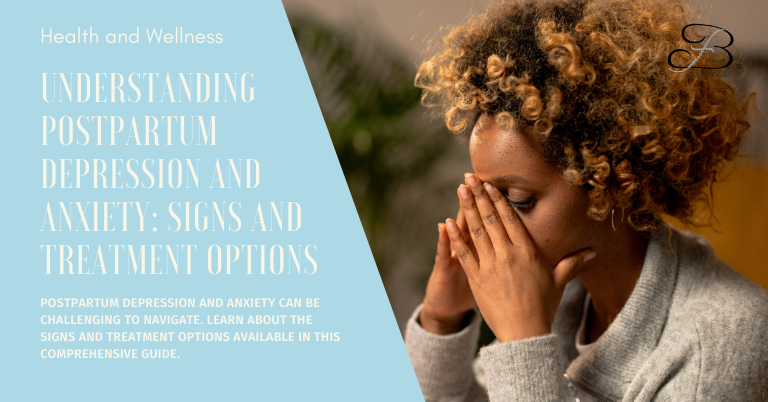Introduction
Postpartum depression and anxiety are common mental health disorders that affect many new mothers. While it is normal for new moms to experience some level of stress and anxiety during the postpartum period, these disorders can have a significant impact on a mother's ability to care for herself and her baby.
In this guide, we will discuss the signs and symptoms of postpartum depression and anxiety, as well as the available treatment options.

Signs and Symptoms of Postpartum Depression
Postpartum depression is a mood disorder that affects new mothers after childbirth. It is estimated that up to 20% of new mothers experience postpartum depression, making it a common mental health disorder. Some of the common signs and symptoms of postpartum depression include:
- Feelings of sadness and hopelessness: New mothers may experience feelings of intense sadness and hopelessness that persist for several weeks or months after giving birth.
- Lack of interest in activities: New mothers with postpartum depression may lose interest in activities they once enjoyed, including spending time with their baby.
- Changes in appetite and sleep: Postpartum depression can cause changes in appetite and sleep patterns, leading to weight gain or loss and insomnia.
- Difficulty bonding with the baby: New mothers with postpartum depression may have difficulty bonding with their baby, which can impact the development of a healthy mother-child relationship.
- Thoughts of self-harm: In severe cases, postpartum depression can lead to thoughts of self-harm or suicide.
Signs and Symptoms of Postpartum Anxiety
Postpartum anxiety is another common mental health disorder that affects new mothers after childbirth. While some level of anxiety is normal during the postpartum period, postpartum anxiety can be more severe and persistent. Some of the common signs and symptoms of postpartum anxiety include:
- Excessive worry: New mothers with postpartum anxiety may experience excessive worry about their baby's health and safety, as well as their own ability to care for their baby.
- Panic attacks: Postpartum anxiety can cause panic attacks, which are sudden and intense feelings of fear and anxiety.
- Physical symptoms: Postpartum anxiety can cause physical symptoms such as chest pain, shortness of breath, and dizziness.
- Sleep disturbances: Postpartum anxiety can also cause sleep disturbances, including insomnia and nightmares.
Treatment Options for Postpartum Depression and Anxiety
If you suspect that you or a loved one is experiencing postpartum depression or anxiety, it is important to seek professional help. Treatment options for postpartum depression and anxiety may include:
- Psychotherapy: Psychotherapy, also known as talk therapy, is a common treatment option for postpartum depression and anxiety. This type of therapy can help new mothers identify and manage their symptoms, as well as develop healthy coping strategies.
- Medication: Antidepressants and anti-anxiety medications may be prescribed to help manage the symptoms of postpartum depression and anxiety.
- Self-care: Self-care is an important component of managing postpartum depression and anxiety. This can include activities such as exercise, meditation, and spending time with friends and family.
- Support groups: Support groups can provide a safe and supportive environment for new mothers to discuss their experiences and connect with others who are going through similar challenges.
In addition to the treatment options mentioned above, there are several other things that new mothers can do to support their mental health during the postpartum period.

One important step is to prioritize self-care. This can include things like getting enough sleep, eating a healthy diet, and engaging in physical activity. Self-care can also involve taking time for yourself, whether that means reading a book, taking a relaxing bath, or engaging in a hobby you enjoy.
Another helpful strategy is to reach out for support from loved ones. Many new mothers feel isolated and overwhelmed during the postpartum period, but having a strong support network can make a big difference. This may include family members, friends, or other new mothers who are going through similar experiences.
Finally, it is important to recognize that postpartum depression and anxiety are not a sign of weakness or failure. These disorders are common and treatable, and seeking help is a courageous and important step towards recovery.
In some cases, postpartum depression and anxiety may not resolve on their own, and may require ongoing treatment and support. It is important for new mothers to stay engaged in their treatment and to be patient with themselves as they work towards recovery.
Overall, the postpartum period can be a challenging time for new mothers, but with the right support and resources, it is possible to overcome these challenges and enjoy this special time in your life. Remember to prioritize self-care, reach out for support, and seek professional help if you are experiencing symptoms of postpartum depression or anxiety.

